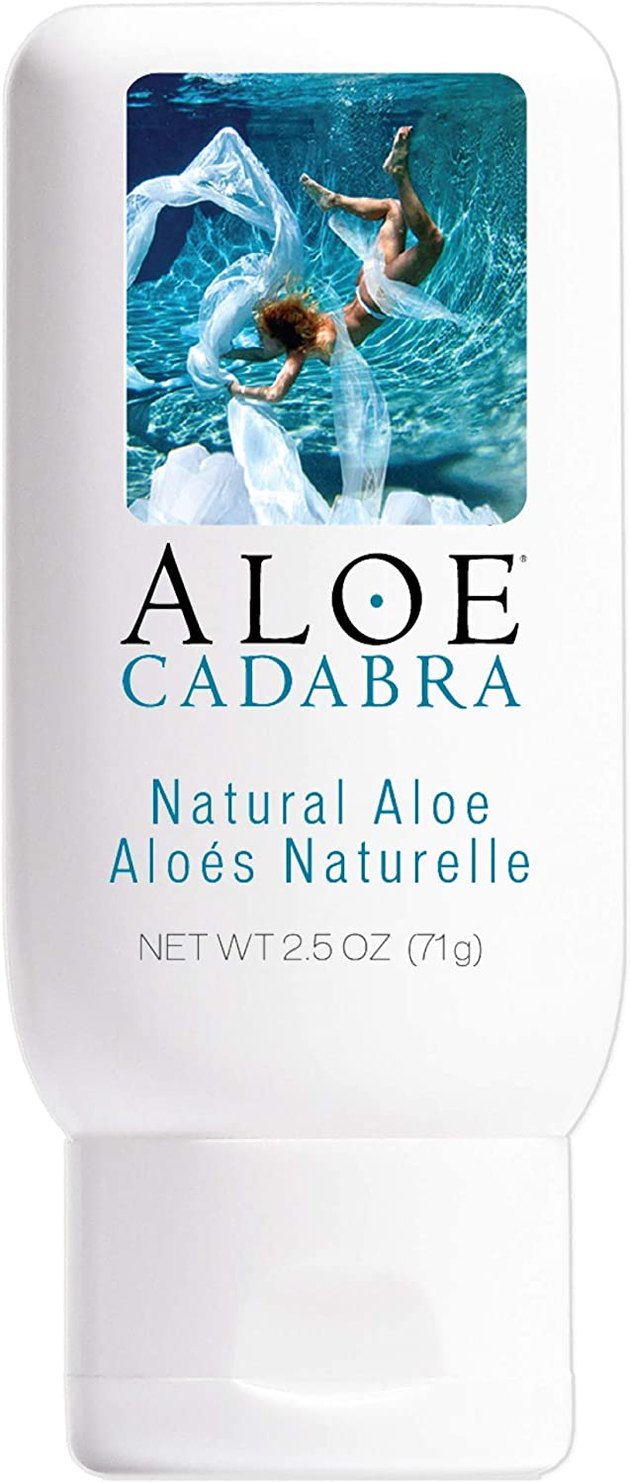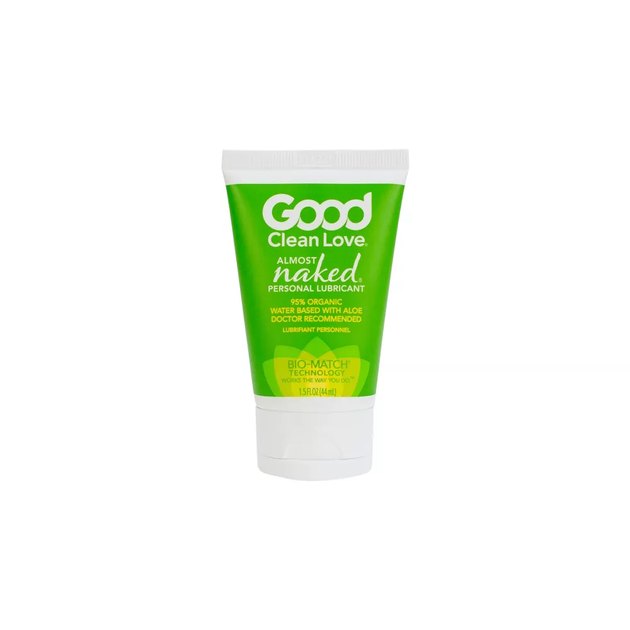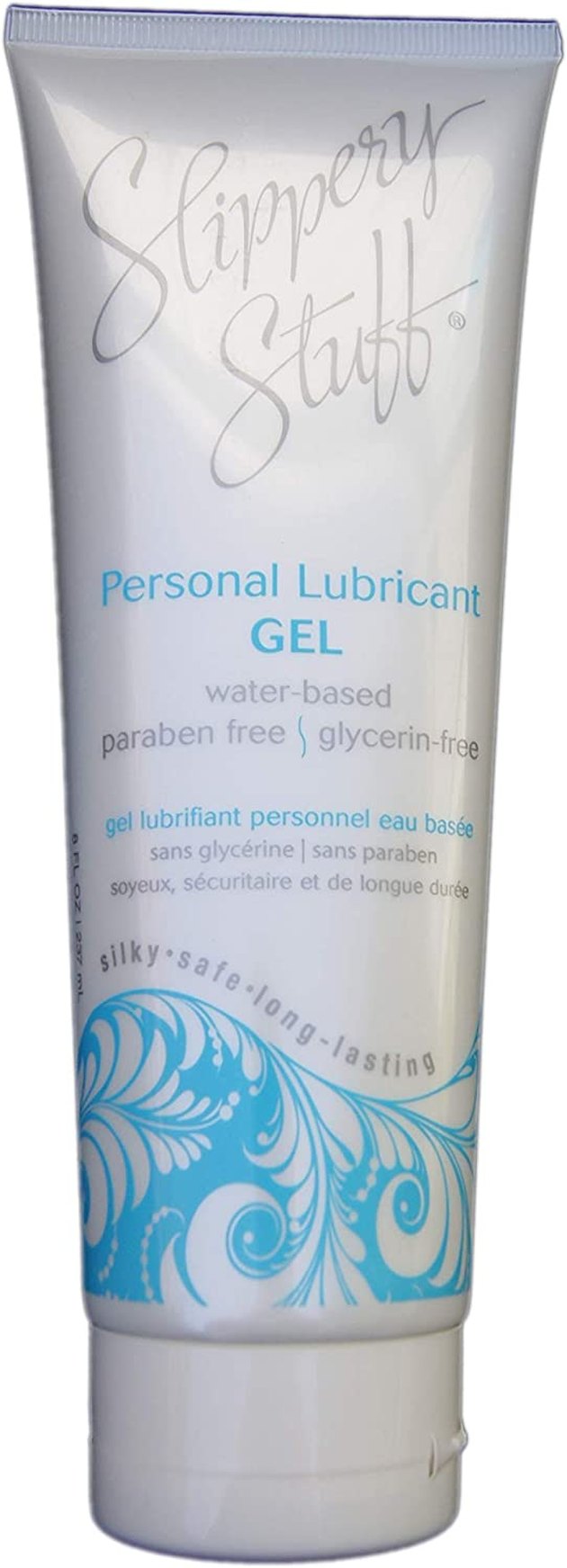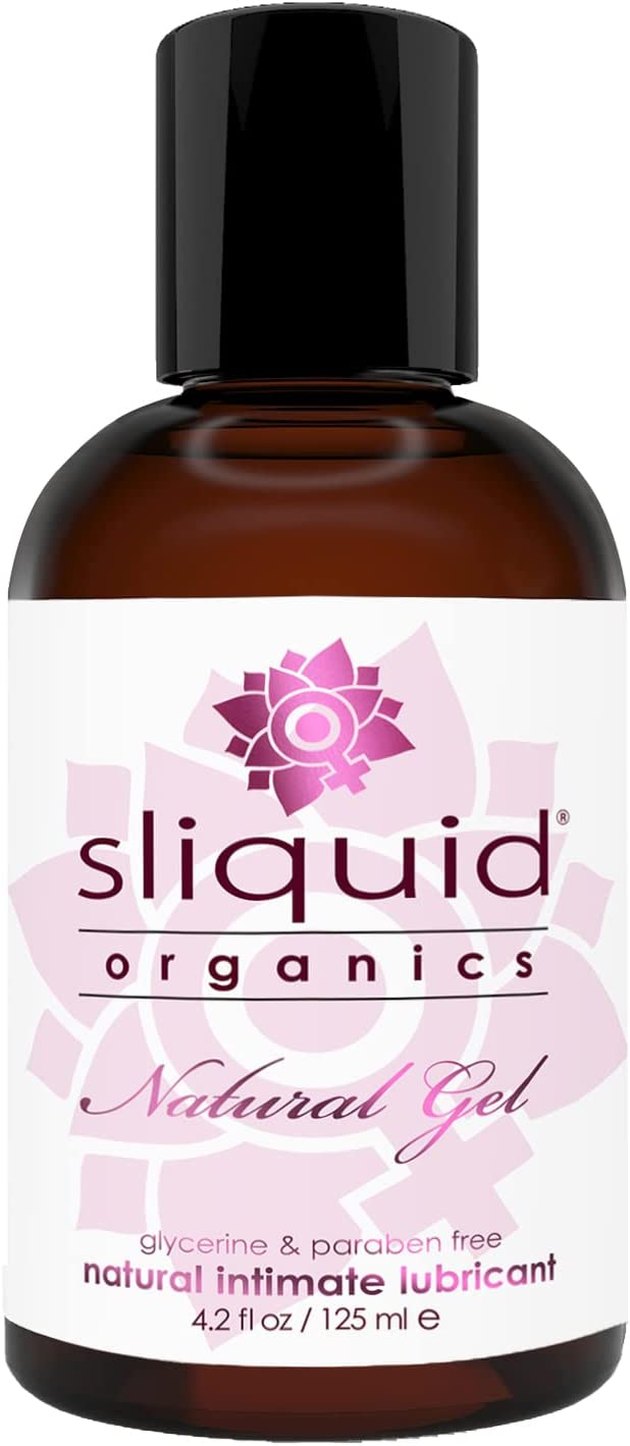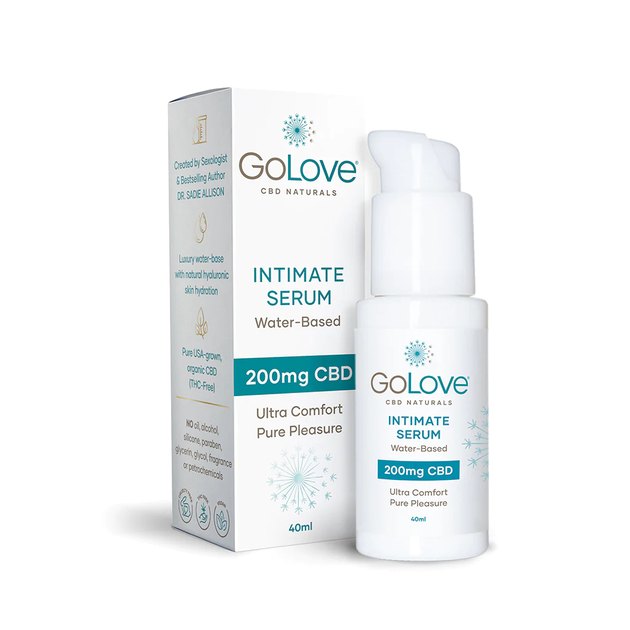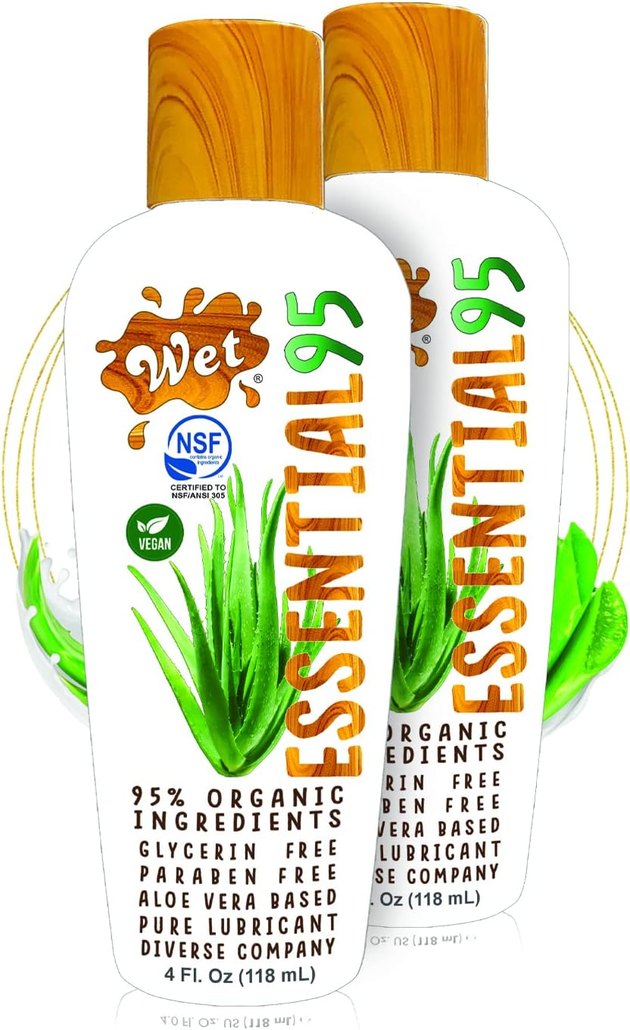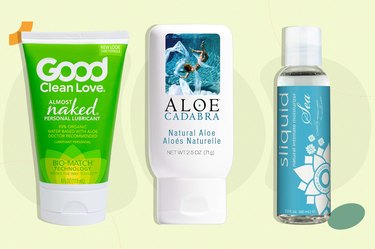
Using personal lubricants (lubes, for short) can enhance sexual pleasure and make for a better experience by reducing friction and dryness during sex. But not all lubes are created equal — especially if you have sensitive skin.
Anyone can use lubrication products, says Amy Wetter, MD, a board-certified ob-gyn at Pediatrix Medical Group in Atlanta, Georgia. But people with sensitive skin may find that adding the wrong lube to their intimate lives causes more discomfort than pleasure.
Video of the Day
Video of the Day
"Some ingredients in lubricants can cause irritation to skin and mucous membranes," explains Christie Cobb, MD, FACOG, a board-certified gynecologist and sexual wellness expert in Little Rock, Arkansas. "Irritation from lubricants can cause symptoms such as vaginal infections, burning, itching and rashes."
If you've had a negative encounter with a lube in the past, don't let that stop you from giving them another chance. Here's how to choose the best lube if you have sensitive skin.
The Best Lubes for Sensitive Skin
- Best Overall: Aloe Cadabra Natural Aloe Personal Lubricant & Moisturizer ($9.98, Amazon)
- Best on a Budget: Good Clean Love Almost Naked Personal Lubricant ($6.99, Amazon)
- Best for Vaginal Dryness: Sliquid Sea Natural Intimate Lubricant ($8.80, Amazon)
- Best Water-Based: Slippery Stuff Personal Lubricant Gel ($8.02, Amazon)
- Best Natural: Sliquid Organics Natural Gel ($11.99, Amazon)
- Best for Menopause: GoLove CBD Intimate Serum ($68, GoLove)
- Best pH-Balanced: Wet Essential95 95% Organic Aloe Vera Based Lube ($15.98, Amazon)
How We Chose
We started our search for the best lubes for sensitive skin by tapping relevant medical experts. We spoke to several board-certified gynecologists and a dermatologist who gave their personal recommendations and insights.
We asked them how to choose the right lube to decrease uncomfortable side effects. They recommended the following criteria for a sensitive skin-friendly lube:
- Water-based formula
- Moisturizing ingredients
- Free of potential irritants
- Safe to use with condoms and sex toys
- Doesn't cause a warming sensation
With their expert advice and recommendations, we were able to narrow down the best lubes on the market that are least likely to cause irritation.
1. Aloe Cadabra Natural Aloe Personal Lubricant & Moisturizer
Pros
- Organic and natural ingredients
- Vegan-friendly
- Unscented
Cons
- May need to be reapplied frequently
The best lube for sensitive skin is one that is water-based, free of irritants, pH-balanced and safe for use with condoms and sex toys — and this gynecologist-recommend lube checks every box.
"A great choice that is often overlooked is a natural aloe vera gel, which has the same pH as a healthy vagina," says Barbra Hanna, DO, FACOG, NCMP, a board-certified ob-gyn and menopause practitioner in Wheaton, Illinois. "This contains organic aloe and vitamin E, it's free of parabens and it can be used with latex condoms."
While it comes in a variety of fun flavors, the experts we spoke to explicitly recommended against anything flavored or scented because of the potential to irritate sensitive skin. So, stick to the original version of this pick.
2. Good Clean Love Almost Naked Personal Lubricant
Pros
- Affordable
- Free of artificial fragrance
- Easy clean-up
Cons
- Comes in a small bottle
- Has a faint scent
If you're on the hunt for the best lube for sensitive skin, you'll probably come across Good Clean Love. The brand is woman-owned and originated from the founder's pursuit of pain-free sex. After multiple pregnancies and a declining sex life, founder Wendy Strgar turned to lubes to reduce pain but found that conventional products were harsh and irritating. So, she created her own.
Dr. Hanna approves of this lube because it's water-based, contains aloe and has minimal ingredients. It's also formulated to mimic the body's natural lubrication without stripping its natural moisture.
It has similar ingredients to our top pick by Aloe Cadabra, but user reviews say this one has a faint scent, which likely comes from the undisclosed natural flavors.
3. Sliquid Sea Natural Intimate Lubricant
Pros
- Hypoallergenic
- Unscented
- Glycerin and paraben-free
- Moisturizes with seaweed extracts
Cons
- Dries fairly quickly, per some user reviews
Vaginal dryness affects around 17 percent of people with vaginas ages 18 to 50 and more than half of all postmenopausal people, according to the Cleveland Clinic. Water-based personal lubricants work very well to reduce vaginal dryness, per the National Library of Medicine.
"Sliquid Sea is infused with seaweed extracts that have naturally moisturizing properties and may help skin elasticity," Dr. Wetter says. "This product is vegan, hypoallergenic, unscented and not sticky, and it's also paraben- and glycerin-free."
While glycerin is a widely used humectant in skin care products, it isn't the moisturizing ingredient you want in and around your vagina or rectum. It can alter the vaginal flora and potentially damage or irritate cells, according to March 2014 research in Environmental Health Perspectives. And some budding research has linked it to an increased risk of transmitting STIs.
4. Slippery Stuff Personal Lubricant Gel
Pros
- Pleasant gel consistency
- Large 8-ounce bottle
- No sticky residue
Cons
- Contains phenoxyethanol, which some people are allergic to
"This personal lubricant is water-based and has a pH similar to that of the natural vaginal pH," explains Jill Purdie, MD, an Atlanta-based board-certified ob-gyn.
Because it's water-based, it's suitable for condoms and certain sex toys. Other types of lube can wear down condoms, so water-based lubes are best for the added protection from unwanted pregnancy and STIs. Water-based lubes are also the least irritating, per Cleveland Clinic, though they may not be as long lasting as other types of lube.
Despite some of the drawbacks of water-based lube, they're overwhelmingly the recommendation of the medical experts we spoke to. They're both effective and safe, according to a March 2023 trial in the Journal of Sexual Medicine.
One thing to consider with this product: It contains phenoxyethanol, a chemical used as a preservative in cosmetics that has been linked to skin irritation and allergic reactions, but the risks are generally low, per the Environmental Working Group.
5. Sliquid Organics Natural Gel
Pros
- Vegan ingredients
- Infused with botanical ingredients
- Neutral pH balance
Cons
- May need frequent reapplication
Natural doesn't always mean better, but in the case of this lube, it does. This gel lube has a short ingredient list, all of which are vegan and naturally derived. It's a water-based lube and contains aloe as the first ingredient.
"This lube is infused with aloe vera leaf, botanical extracts and natural oils," says Jeannette Graf, MD, a board-certified dermatologist and assistant clinical professor of dermatology at Mount Sinai School of Medicine in New York. "It's free of glycerin and parabens, making it a great option for those with sensitive skin looking for increased moisture and pleasure."
6. GoLove CBD Intimate Serum
Pros
- Easy-to-use pump
- Tested by dermatologists
- Doubles as a vaginal moisturizer
Cons
- Pricey
With menopause comes hormonal changes, which can make vaginal tissue drier and thinner, according to the Office on Women's Health. The right lube — or serum in this case — may help.
"GoLove is a water-based and hypoallergenic lubricant that uses surfactants that are often used in other products for sensitive skin," Dr. Cobb says, adding that it's pH-balanced and contains CBD.
The product was created by a sexologist, who added organic CBD to this lube to reduce sex-related pain and anxiety. Up to 45 percent of postmenopausal people experience painful sex, which is typically caused by vaginal thinning and dryness, per the North American Menopause Society.
To counteract vaginal dryness during menopause, the Office on Women's Health recommends using a water-based lubricant and vaginal moisturizer. This serum doubles as both. It can be used to reduce friction during sex or simply to moisturize the vaginal area.
While topical products like this can help vaginal dryness and pain from intercourse during menopause, Dr. Hanna reminds us that sometimes more intervention with the help of a gynecologist is needed.
7. Wet Essential 95 95% Organic Aloe Vera Based Lube
Pros
- Slippery consistency
- Unscented and gentle formula
- Packed with plant-based ingredients
Cons
- Not widely available
- Can be messy, per some reviews
Vaginal pH is an overlooked part of vaginal health. The vagina is mildly acidic with a pH between 3.8 and 4.5, according to Axia Women's Health. It's a pretty delicate ecosystem, and the wrong lube can throw off the balance entirely.
"If the pH is not appropriately balanced, a vaginal infection is more likely," explains Dr. Cobb, who recommends this pH-balanced lube. "It's designed to meet the World Health Organization's guidelines for pH."
It's also unscented, water-based and formulated with minimal, gentle ingredients, so it meets our other criteria.
To keep tissue moisturized, it contains tremella, a mushroom that you may not expect to be just as effective at — or better than — hydrating skin as hyaluronic acid, per a January 2021 review in the International Journal of Immunopathology and Pharmacology.
What to Look for in a Lube for Sensitive Skin
How do you know if a lube is good for sensitive skin? Just take a peek at the ingredient list.
1. Water-Based or Natural Formulas
Every gynecologist and dermatologist we spoke to had one central piece of advice for people with sensitive skin: Choose a water-based lube.
They have a few advantages:
- Suitable for condoms and sex toys
- Easy to clean off skin and fabric
- Pleasant consistency
- Tends to be less irritating
But water-based lube isn't without some drawbacks. They're notorious for absorbing into the skin quickly, so they may have to be reapplied frequently. Some people also find them to have a texture that starts out slippery but later becomes sticky.
Still, the advantages outweigh the disadvantages for people with sensitive skin.
Additionally, Dr. Graf recommends a hypoallergenic formula. She says to look for ingredients like aloe vera, chamomile and vitamin E.
2. No Irritating Ingredients
Certain ingredients can cause irritation, disrupt the vaginal pH and reduce the effectiveness of condoms.
Per our experts, you'll want to avoid the following:
- Glycerin
- Parabens
- Petroleum (may be called petrochemicals)
- Mineral oil
- Spermicides like propylene glycol
"Steer clear of anything that claims to warm or tingle or has flavoring, and watch out for coconut oil, which can throw off the vaginal microbiome and is contraindicated with condom use," Dr. Cobb adds. She also says to avoid homemade lube.
When to See a Doctor
It can feel taboo to talk about sex and issues arising from it, but some symptoms are worth seeing a doctor. "The vulva and vagina are sensitive areas," Dr. Cobb reminds us.
If you experience any of the following after using a new lubricant, our experts say to discontinue use and see your doctor:
- Itching
- Stinging
- Burning
- Swelling
- Pain
- Irritation
- Redness
- Rash
Symptoms from menopause should be managed with the help of a gynecologist, Dr. Hanna says. "Treatments are available that work at the vaginal tissue level to reverse a lack of moisture from low estrogen levels," she explains, adding that personal lubricants don't always provide enough relief from vaginal dryness and painful intercourse.
FAQ
1. What Lube Does Not Cause Yeast Infections?
Flavored lubes contain sugar and can lead to yeast infections. To reduce the risk of developing a yeast infection, avoid lubes that are flavored. Stick to unscented, water-based lubes, like our picks above.
2. What Are Bad Reactions to Lube?
Some people can have allergic reactions to lube, according to Dr. Graf. Symptoms may include stinging, burning, irritation, pain, rash, itching or swelling. This can happen to either sexual partner, even with the use of condoms.
If you experience a bad reaction to lube, discontinue use immediately and contact a health care professional.
Warning
Although rare, it's possible to have a severe allergic reaction to lube that includes symptoms such as hives or trouble breathing. If you experience these symptoms, seek immediate medical attention, as they can be life-threatening.
3. Why Does Lube Desensitize Me?
Lube can cause some men to experience desensitization because it reduces friction. This may help them last longer during sex, but it can also have the negative effect of reducing sensation.
- Cleveland Clinic: "Vaginal Dryness"
- National Library of Medicine: "Vaginal dryness alternative treatments"
- Environmental Health Perspectives: “A Question for Women's Health: Chemicals in Feminine Hygiene Products and Personal Lubricants”
- Cleveland Clinic: "Lubricant Alternatives: What To Use and What To Avoid"
- Journal of Sexual Medicine: “A randomized trial on the effectiveness and safety of 5 water-based personal lubricants”
- Environmental Working Group: “Phenoxyethanol”
- Office on Women’s Health: “Menopause and sexuality”
- Axia Women’s Health: “How To Maintain A Healthy Vaginal pH—And Why It Really Matters”
- International Journal of Immunopathology and Pharmacology: “A review on the production, structure, bioactivities and applications of Tremella polysaccharides”
Is this an emergency? If you are experiencing serious medical symptoms, please see the National Library of Medicine’s list of signs you need emergency medical attention or call 911.
